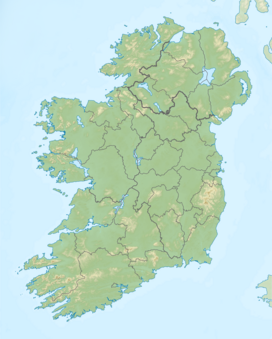Barnaslingan
| Barnaslingan | |
|---|---|
| Barr na Slinneán | |

Looking across The Scalp from the summit of Barnaslingan
|
|
| Highest point | |
| Elevation | 238 m (781 ft) |
| Coordinates | 53°13′10.04″N 6°10′35.9″W / 53.2194556°N 6.176639°WCoordinates: 53°13′10.04″N 6°10′35.9″W / 53.2194556°N 6.176639°W |
| Geography | |
| Location | County Dublin, Ireland |
| Parent range | Dublin Mountains |
| OSI/OSNI grid | O2191620294 |
| Topo map | OSI Discovery #50 |
Barnaslingan (Irish: Barr na Slinneán, meaning "summit of the shoulder blades") is a 238 metres (781 feet) high hill in County Dublin, Ireland. It is most noted for the geological feature known as The Scalp (Irish: An Scailp, meaning "the chasm" or "cleft") that lies to the west of the summit. Samuel Lewis, in A Topographical Dictionary of Ireland (1837), described it thus: “A deep natural chasm in the mountain, forming a defile with lofty and shelving ramparts on each side, from which large detached masses of granite many tons of weight have fallen, on each side large masses of detached rock are heaped together in wild confusion, apparently arrested in their descent, and threatening at every moment to crush the traveller by their fall”.
The Scalp is a narrow glacial valley formed approximately 12,000 years ago during the last Ice Age. During this period a massive ice sheet covered the Irish Sea extending inland over the Dublin-Wicklow Mountains. As the ice melted several glacial lakes formed, including one at Enniskerry, enclosed by the mountains and the ice sheet. The pressure created by this volume of water pressing against the bedrock eventually found a weak point and gouged out the channel now known as The Scalp. The same process created similar features in nearby County Wicklow at the Glen of the Downs and at the Rocky Valley north of the Great Sugar Loaf. On account of its status as an example of a glacial lake overflow, it is listed as an Area of Scientific Interest. The steep, rocky slopes are home to a herd of feral goats and the area is also a habitat for deer and badgers.
...
Wikipedia

